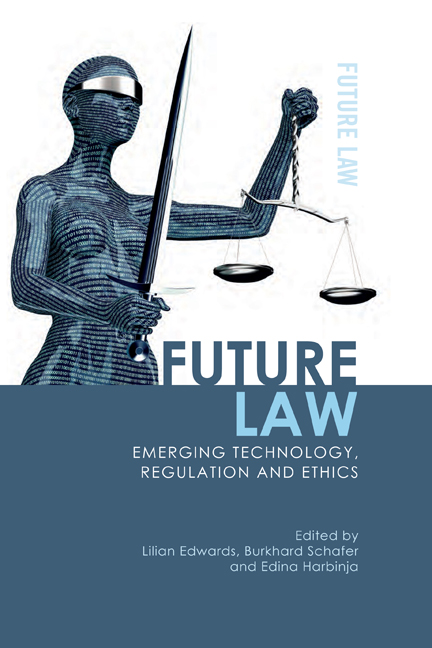Book contents
- Frontmatter
- Contents
- List of Contributors
- List of Figures and Tables
- Table of Cases
- Table of Legislation
- 1 The Future’s Already Here: It’s Just Unevenly Edited
- Part I From Privacy and Princesses, to Security and Star Wars
- 2 Privacy and Identity through the Eyes of Disney Princesses
- 3 White Noise from the White Goods? Privacy by Design for Ambient Domestic Computing
- 4 Citizen-consumers in a Personalised Galaxy: Emotion-influenced Decision Making, a True Path to the Dark Side?
- 5 Big Data Ethics: Darth Vader and the Green Cross Man
- 6 Security Vulnerabilities, Backdoors, Exploits and the Marketplace for Each: The Return of Boba Fett – Bug Bounty Hunter in the New Republic
- Part II A Matter of (Future) Life and Death
- 7 Will My Genes Really Help Me Fit Into Those Jeans? Personal Genomics and Wrap Contracts
- 8 On Living and Undead Wills: ZombAIs, Technology and the Future of Inheritance Law
- 9 ‘Be Right Back’: What Rights Do We Have over Post-mortem Avatars of Ourselves?
- Part III Regulating Autonomous Technologies: Software Are Doing it for Themselves
- 10 Autonomous Intelligent Agents and the Roman Law of Slavery
- 11 Autonomous Vehicles: An Analysis of the Regulatory and Legal Landscape
- Part IV Textual Poaching: Copyright in a Remixed World
- 12 Living in a Remixed World: Comparative Analysis of Transformative Uses in Copyright Law
- 13 Repost This: Instagram and the Art of Re-photography
- Index
10 - Autonomous Intelligent Agents and the Roman Law of Slavery
Published online by Cambridge University Press: 17 September 2020
- Frontmatter
- Contents
- List of Contributors
- List of Figures and Tables
- Table of Cases
- Table of Legislation
- 1 The Future’s Already Here: It’s Just Unevenly Edited
- Part I From Privacy and Princesses, to Security and Star Wars
- 2 Privacy and Identity through the Eyes of Disney Princesses
- 3 White Noise from the White Goods? Privacy by Design for Ambient Domestic Computing
- 4 Citizen-consumers in a Personalised Galaxy: Emotion-influenced Decision Making, a True Path to the Dark Side?
- 5 Big Data Ethics: Darth Vader and the Green Cross Man
- 6 Security Vulnerabilities, Backdoors, Exploits and the Marketplace for Each: The Return of Boba Fett – Bug Bounty Hunter in the New Republic
- Part II A Matter of (Future) Life and Death
- 7 Will My Genes Really Help Me Fit Into Those Jeans? Personal Genomics and Wrap Contracts
- 8 On Living and Undead Wills: ZombAIs, Technology and the Future of Inheritance Law
- 9 ‘Be Right Back’: What Rights Do We Have over Post-mortem Avatars of Ourselves?
- Part III Regulating Autonomous Technologies: Software Are Doing it for Themselves
- 10 Autonomous Intelligent Agents and the Roman Law of Slavery
- 11 Autonomous Vehicles: An Analysis of the Regulatory and Legal Landscape
- Part IV Textual Poaching: Copyright in a Remixed World
- 12 Living in a Remixed World: Comparative Analysis of Transformative Uses in Copyright Law
- 13 Repost This: Instagram and the Art of Re-photography
- Index
Summary
Commerce and Machines
The ability to transact with machines has existed for over two thousand years: Hero of Alexandria invented a coin-operated holy water dispenser in the first century AD/ce. As the capability of machines has increased over time, so has the complexity of human interactions with them. In a legal sense, transacting suggests that the action generates rights and obligations between parties. In an effort to produce a societally ‘fair’ result, the law has developed mechanisms to allow appropriate remedies when a party transacts with a machine.
The common law solution has traditionally been the notion of unilateral contract or standing offer. A unilateral contract can be formed when an offer is made, not to a specific individual, but to a class of people, or the world at large, and it remains open until accepted by someone (acceptance is usually through conduct).
A vending machine operates on this mechanism. The seller uses the machine to offer a bottle of water for £1 and the purchaser accepts the offer by placing a pound coin in the slot and pressing the ‘vend’ button. The transaction cannot be revoked, once the buyer has inserted the money. If the machine fails to vend, the law provides that there is a breach of contract between the purchaser and the proprietor of the vending machine, and provides remedies accordingly. Alternatively, the English courts have held that a parking ticket machine makes a standing offer capable of being accepted by users of the car park, with a binding contract formed when the ticket is accepted by the driver.
Around two thousand years after Hero of Alexandria's death, a computer scientist and cryptographer, Nick Szabo, predicted how the rise of computer networks and algorithms would change the way in which contracts were made. He developed a concept of ‘smart contracts’, which minimise the human interaction with and automate the execution and performance of the contract by translating contractual obligations into computer code. In this context, Szabo perceives the vending machine as an ‘autonomous transfer of property’.
From the perspective of contract law, the vending machine is not a party to the contract, nor is it a (human) agent acting on the seller's behalf. Rather, it is merely the parties’ chosen method of making a contract.
- Type
- Chapter
- Information
- Future LawEmerging Technology, Regulation and Ethics, pp. 295 - 312Publisher: Edinburgh University PressPrint publication year: 2020

